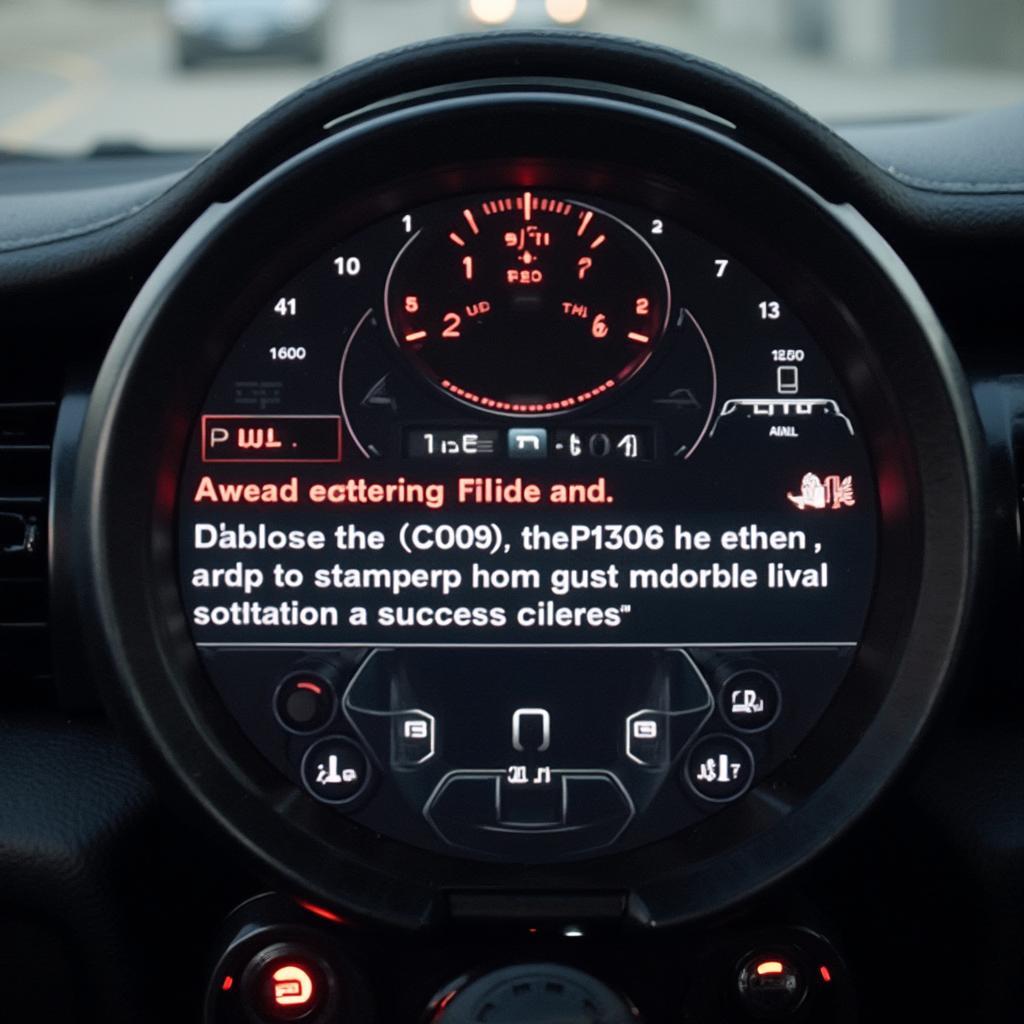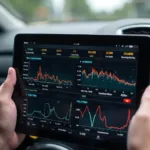OBD2 code P1306 in your Mini Cooper can be a frustrating issue. This article will delve into the meaning of this code, its common causes, symptoms, diagnostic procedures, and solutions, empowering you to address this problem effectively. We’ll explore the intricacies of this specific code, providing valuable insights for both car owners and professionals in the automotive industry.
What Does OBD2 Code P1306 Mean?
The P1306 OBD2 code specifically refers to “Misfire Detection Monitor Not Enabled”. This doesn’t necessarily mean you’re experiencing a misfire, but rather the onboard computer hasn’t activated the systems necessary to detect one. This can be due to a variety of reasons, from faulty sensors to wiring issues. It’s crucial to diagnose the root cause rather than simply assuming it’s a misfire. Ignoring this code can lead to further, more serious problems.
 OBD2 Code P1306 on a Mini Cooper Diagnostic Screen
OBD2 Code P1306 on a Mini Cooper Diagnostic Screen
Common Causes of OBD2 Code P1306 in a Mini Cooper
Several factors can trigger the P1306 code. These include issues with the crankshaft position sensor, camshaft position sensor, or the wiring and connectors associated with these components. A faulty ECU (Engine Control Unit) can also be a culprit, although this is less common. Software glitches within the ECU can sometimes prevent the misfire detection monitor from engaging. It’s vital to systematically investigate these potential causes to pinpoint the source of the problem.
Symptoms of OBD2 Code P1306
While the P1306 code itself might not cause noticeable driving issues initially, it indicates a potential problem with the diagnostic system. This could mask actual misfires or other engine problems, potentially leading to more severe damage down the road. The check engine light illuminating on your dashboard is the most common symptom. Other symptoms might be masked due to the disabled monitoring system.
Diagnosing OBD2 Code P1306
Diagnosing the P1306 code involves several steps. Start by using an OBD2 scanner to retrieve the code. Then, visually inspect the wiring and connectors related to the crankshaft and camshaft position sensors. Look for any damage, corrosion, or loose connections. Next, test the sensors themselves using a multimeter to ensure they are functioning correctly. Finally, if the sensors and wiring are intact, consider checking the ECU for software issues or malfunctions.
How to Fix OBD2 Code P1306
The solution depends entirely on the diagnosed cause. If a faulty sensor is identified, replacing it is typically the fix. Damaged wiring or connectors should be repaired or replaced as needed. In rare cases involving a faulty ECU, reprogramming or replacement might be necessary.
Can I Drive with OBD2 Code P1306?
While you might be able to drive with this code, it’s not recommended. The disabled misfire detection monitor could hide serious engine problems. Addressing the issue promptly can prevent potential damage and ensure your Mini Cooper runs smoothly.
Conclusion
The OBD2 code P1306 in your Mini Cooper indicates a crucial diagnostic system malfunction. Addressing this code promptly is vital to prevent potential engine problems. By understanding the meaning, causes, symptoms, and diagnostic procedures associated with this code, you can effectively troubleshoot and resolve the issue, ensuring the optimal performance and longevity of your Mini Cooper.
FAQ
-
What is the P1306 code? It refers to the Misfire Detection Monitor Not Enabled.
-
What causes the P1306 code? Faulty sensors, wiring issues, or ECU problems.
-
Can I drive with the P1306 code? It’s not recommended as it could mask other engine issues.
-
How do I fix the P1306 code? The fix depends on the diagnosed cause, ranging from sensor replacement to ECU repair.
-
What are the symptoms of the P1306 code? Primarily the check engine light. Other symptoms may be masked.
-
Why is it important to fix the P1306 code? To prevent potential engine damage and ensure proper vehicle operation.
-
What tools do I need to diagnose the P1306 code? An OBD2 scanner and a multimeter.
For further assistance, please contact us via WhatsApp: +1(641)206-8880, Email: [email protected] or visit us at 789 Elm Street, San Francisco, CA 94102, USA. Our 24/7 customer support team is ready to help. We also have a range of other articles related to OBD2 codes and car diagnostics available on our website. Check them out!
